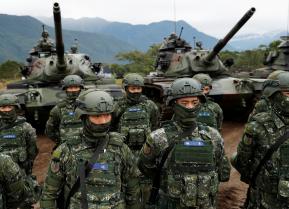Why China Would Have Some Major Problems If It Invaded Taiwan
It would not exactly be easy.
The second leg of a more active political warfare strategy would be to convince Beijing that Taiwan’s allies—the United States., and possibly Japan—would act quickly should the PLA attempt an invasion of Taiwan. In other words, Beijing should not longer be kept guessing whether the United States would enter a conflict in the Taiwan Strait, especially at a time when Washington’s commitment to the region—and to Taiwan more specifically—is in serious doubt. Strategic ambiguity, which has served as a cornerstone of Washington’s policy in the Taiwan Strait since the conclusion of the Korean War, should be abandoned and replaced by a series of well advertised tripwires or “red lines” that, if crossed, would prompt a response by the U.S. military. Tokyo is also ripe for closer cooperation with Taiwan, and as such, political warfare that plays up the possibility of joint efforts between the two countries could be of great assistance to Taiwan. The more Beijing is convinced that the United States., and possibly Japan, would intervene in the Taiwan Strait, the greater will be its reluctance to launch operations that would spark such a response, as their entry in a conflict would substantially increase the costs of an invasion while diminishing the likelihood of a quick “low-cost” resolution on Beijing’s terms.
Elsewhere, Taiwanese lobbyists and the Taiwanese diaspora could make more effective use of the island’s assets—a vibrant liberal democracy and an important economy—to encourage the international community to adopt a more vocal line in its opposition to the resolution of the Taiwan “question” by military or coercive means. Convincing Beijing that the international community would not countenance use of force—and would slap painful economic sanctions should it decide to do so—would contribute to Taipei’s deterrent. Helping visitors to Taiwan better understand the nature and preciousness of its unique society, and encouraging them to be more proactive in their home countries convincing their representatives to take a more principled stance on Taiwan could go a long way. Existing programs under Taiwan’s Ministry of Foreign Affairs could serve as a basis for such efforts; increasing contact via other departments—e.g., creating more exchange programs for foreign military personnel to undergo language training in Taiwan—should also be explored.
Additionally, taishang, the Taiwanese who operate businesses in China and who played a crucial role in helping develop the Chinese economy over the decades, could also threaten to cease their operations or pull out altogether if the PLA were activated in the Strait. Though happy to make money in China, most taishang (including the many who vote for the KMT) remain proud Taiwanese who do not want to see their home country devastated by war. Their possible role as a pressure point against Beijing should not be underestimated.
One last area where Taiwan could do more to deter Beijing is in cyber warfare, or “electronic sabotage.” Using intelligence assets in China (closer contact between the two societies works both ways and doesn’t only create opportunities for China), Taiwan could identify and select civilian and military targets for retaliation, with the aim of severely disrupting China’s ability to operate normally should it launch an attack against the island. The banking and high-tech sectors would be likely targets. On the military side, promising to degrade, or perhaps even disable, China’s nuclear deterrent—even if momentarily— or knocking out its air defense systems, thus exposing China to USAF bombing runs, would be enough to make Beijing think twice about launching an invasion.
In all those efforts, Taiwan would need to strike a balance between signaling its intent and capability to launch disruptive attacks of that nature—in other words, for deterrence to work, Beijing must be convinced that the threat is real—and the need to protect itself against Chinese espionage which could undermine those efforts.
In the end, absent a U.S. and Japanese commitment to intervene in the early stages of an attempted PLA invasion of Taiwan, there is only a slim likelihood that the Taiwanese military would be able to “defeat” its opponent in the conventional sense of the term. The force disparity between the two sides has simply become too wide. As such, under prevailing circumstances, the only way that Taiwan can defeat China is to make sure that the PLA is never used to attack Taiwan. Deterrence, therefore, is its most credible asset, and one which it can put to much better use.


